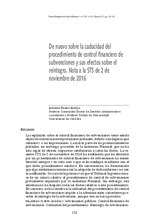Mostrar el registro sencillo del ítem
De nuevo sobre la caducidad del procedimiento de control financiero de subvenciones y sus efectos sobre el reintegro. Nota a la STS de 2 de noviembre de 2016
| dc.contributor.author | Bueno Armijo, Antonio | |
| dc.date.accessioned | 2022-12-12T13:21:54Z | |
| dc.date.available | 2022-12-12T13:21:54Z | |
| dc.date.issued | 2017 | |
| dc.identifier.issn | 1575-1333 | |
| dc.identifier.uri | http://hdl.handle.net/10396/24385 | |
| dc.description.abstract | La regulación sobre el control financiero de subvenciones viene siendo objeto de numerosas interpretaciones judiciales, debido a las lagunas que contiene y a sus imprecisiones. La mayor parte de los pronunciamientos judiciales, sin embargo, proceden de la Audiencia Nacional, que no ha sido capaz de ofrecer respuestas satisfactorias a todas las dudas. La reciente STS de 2 de noviembre de 2016 ha establecido que los afectados por un procedimiento de control financiero de subvenciones no tienen derecho siempre y en todo caso a que se les notifique el informe con el que dicho procedimiento concluye. En consecuencia, ha determinado que el procedimiento termina con la adopción de dicho informe y no con su notificación. Se trata de la primera vez que el Tribunal Supremo conoce de un asunto relativo al procedimiento de control de subvenciones previamente enjuiciado por la Audiencia Nacional. Sin embargo, esta sentencia no ha disipado todas las dudas relativas a este procedimiento. En concreto, no ha resuelto si la caducidad del procedimiento de control financiero de subvenciones impide a la Administración concedente proceder al reintegro de la subvención, aunque este no haya prescrito. | es_ES |
| dc.description.abstract | The regulation on the financial control over public grants has been subject to legal interpretation due to its legal gaps and uncertainties. However, almost all the body of case law regarding this matter has been developed by the National High Court (Audiencia Nacional), which has been unable to offer a satisfactory answer to several doubts. The recent judgment delivered by the Spanish Supreme Court (Tribunal Supremo) on the 2nd ofNovember 2016 has ruled that citizens have not the right to be notified of the final report on the financial control procedure. As a result, the Court has sentenced that this procedure finishes with the submission of the final report and not with its notification. This has been the first time that the Spanish Supreme Court has revised a case on the financial control procedure previously ruled by the National High Court. However, this judgment has not resolved sorne other doubts and questions related to the financial control o ver public grants. Specifically, it has not cleared up if, as a consequence of the expiration of the financial control procedure, the Public Administration loses its right to ask for the reimbursements of grants, even if the statute of limitations does not apply. | es_ES |
| dc.format.mimetype | application/pdf | es_ES |
| dc.language.iso | spa | es_ES |
| dc.publisher | Tribunal de Cuentas | es_ES |
| dc.rights | https://creativecommons.org/licenses/by-nc-nd/4.0/ | es_ES |
| dc.source | Revista Española de Control Externo v. XIX, nº 55, 135-150 (2017) | es_ES |
| dc.subject | Ayudas y subvenciones públicas | es_ES |
| dc.subject | Control financiero de subvenciones | es_ES |
| dc.subject | Caducidad del procedimiento | es_ES |
| dc.subject | Reintegro de subvenciones | es_ES |
| dc.subject | Public aids and grants | es_ES |
| dc.subject | Financial control over grants | es_ES |
| dc.subject | Expiry of the procedure | es_ES |
| dc.subject | Withdrawal of grants | es_ES |
| dc.title | De nuevo sobre la caducidad del procedimiento de control financiero de subvenciones y sus efectos sobre el reintegro. Nota a la STS de 2 de noviembre de 2016 | es_ES |
| dc.type | info:eu-repo/semantics/article | es_ES |
| dc.relation.publisherversion | https://recex.tcu.es/es/hemeroteca/ | es_ES |
| dc.rights.accessRights | info:eu-repo/semantics/openAccess | es_ES |

